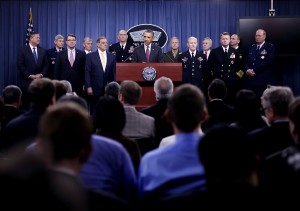US Navy: Pivot to Asia won’t hurt Mideast presence

President Barack Obama gestures during a news briefing at the Pentagon, Thursday, Jan. 5, 2012, to talk about defense strategic guidance. From left are, Air Force Secretary Michael Donley, Air Force Chief of Staff Gen. Norton Schwartz, Deputy Defense Secretary Ashton B. Carter, Army Secretary John McHugh, Defense Secretary Leon Panetta, Army Chief of Staff Gen. Raymond T. Odierno, the president, Marine Corps Commandant Gen. James F. Amos, Joint Chiefs Chairman Gen. Martin E. Dempsey. Navy Secretary Ray Mabus, Joint Chiefs Vice Chairman Adm. James A. Winnefeld Jr., Chief of Naval Operations Adm. Jonathan W. Greenert, and National Guard Bureau Chief Gen. Craig R. McKinley. AP
WASHINGTON—The United States will not be “taking its eye off the ball” in the Middle East as it looks to strengthen its military presence in the Asia-Pacific region, the head of the Navy said Tuesday.
Chief of Naval Operations Adm. Jonathan Greenert said that he does not foresee a shift in naval forces from the Middle East. He said the vast majority of America’s 100 deployed ships currently operate in the West Pacific and the Gulf.
“If you ask me what keeps me awake at night, it’s the Strait of Hormuz and business going on in the Arabian Gulf,” Greenert told a seminar organized by the Center for a New American Security think tank in Washington.
He added: “The navy won’t be taking their eye off the ball.”
Iran last week warned American vessels against entering the strait after the US tightened sanctions over Iran’s disputed nuclear program. The strait carries to market much of the oil pumped in the Middle East.
The Obama administration last week unveiled a strategic defense review that wants to enhance the US presence in Asia because of the region’s economic importance and China’s rise as a military power. It seeks to retain American military pre-eminence around the world despite stiff budget cuts to help manage the hulking national debt.
A new report by the Center for a New American Security contends the cuts could leave the US Navy weakened when it needs to build a stronger fleet to preserve American interests, particularly in the West Philippine Sea (South China Sea), a potential regional flashpoint.
“The South China Sea is quite simply the throat of international commerce,” said author Robert Kaplan, who contributed to the report. He said about half of the tonnage of international trade passes through these resource-rich waters.
China claims the sea almost entirely as its own, but the Philippines, Taiwan, Vietnam, Malaysia, Singapore, and Brunei also have territorial claims there.
Kaplan said countries in the region are looking to the U.S. as a necessary balancing force as China’s influence grows, and the US sees its role as one of upholding international rules-based commerce. China, however, views as hegemonic US interference in the balance of power in a region half-a-world away from America, he said.
The report’s editor, Patrick Cronin, said the US is facing cuts equivalent to the whole of Japan’s defense budget annually for the next 10 years, which would alter perceptions in the region about America’s ability to uphold peace and stability.
“If we are not starting to build the navy up to the mid-300s in the course of this decade then in the region we are going to be perceived as a declining power with less ability to backstop the rules of the road,” Cronin told the seminar.
The US Navy currently has 285 ships worldwide, compared with almost 600 during the Cold War presidency of Ronald Reagan in the 1980s. However, it remains a far stronger force than China’s, which is rapidly growing but has only recently launched its first aircraft carrier. The US has five aircraft carrier strike groups based in the Asia-Pacific alone.
Chan Heng Chee, ambassador in Washington for close US ally Singapore, said that although not a claimant, her city state is dependent on international trade and wants to see the disputes in the West Philippine Sea settled according to the UN Convention on the Law of the Sea, a position that Manila and Washington have been pushing as well.
She said the US declaration in 2010 that it also had an interest in the peaceful settlement of those disputes had “changed the chemistry in the region” and had emboldened the claimant states.
But she criticized the Center for a New American Security report for portraying the West Philippine Sea as a test of the effectiveness of US leadership in the region, which she said would only invite a counterchallenge from China. She said that would cause anxiety among Southeast Asian nations, which want good relations with both powers.
She stressed the importance of strong US engagement with China, and urged the Obama administration to put a greater emphasis on trade in the region as it re-orientates its foreign policy toward Asia.
For comprehensive coverage, in-depth analysis, visit our special page for West Philippine Sea updates. Stay informed with articles, videos, and expert opinions.